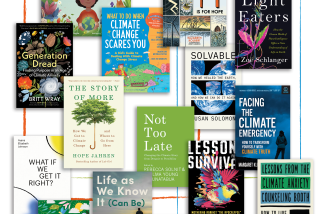A Physicist’s Book on Global Warming Inspires TV Movie
- Share via
A new scientific book intended to promote understanding of the greenhouse effect is being used as the basis for a fictional TV movie examining what life will be like for a group of people in 30 to 40 years if global temperatures climb.
Producer Robert Greenwald calls the proposed movie, currently in development for ABC, a “futuristic ‘Grapes of Wrath.’ ”
It is being adapted by Dennis Nemec from “Dead Heat: The Race Against the Greenhouse Effect,” by Robert Boyle and Dr. Michael Oppenheimer, an atmospheric physicist and senior scientist with the Environmental Defense Fund.
“Instead of the Dust Bowl of the 1930s, it’s set in Oppenheimer’s world, and it’s not too far ahead,” Greenwald said. “It will be about a family that’s on the road in search of a liveable habitat, as the environmental destruction has raised havoc.”
The scenario, in part, as described in “Dead Heat”: “The global economy will gradually feel the strain of the warming as farms, industries and tens of millions of people are forced to migrate and then move again; as natural resources are stretched to the limit and finally are exhausted; as conflicts erupt in the struggle over what remains.”
The project began, Greenwald said, when he consulted the Environmental Media Assn. about doing a film about global warming and was told he should get in touch with Oppenheimer. “Dead Heat” had not yet gone to print, but Greenwald read the manuscript and decided to make his movie.
“It was based, first and foremost, on the opening chapter of his book, which was the most devastating and potent description of what our future will look like, in a very practical and specific way,” said Greenwald, whose TV movie credits include “The Burning Bed,” “Daddy,” “A Deadly Silence” and the upcoming “Hiroshima.”
The fact that some scientists do not agree with Oppenheimer’s grim predictions for the future will not affect the project, Greenwald said.
“It’s a hypothetical case about what could happen, based on a significant amount of scientific knowledge,” he said.






